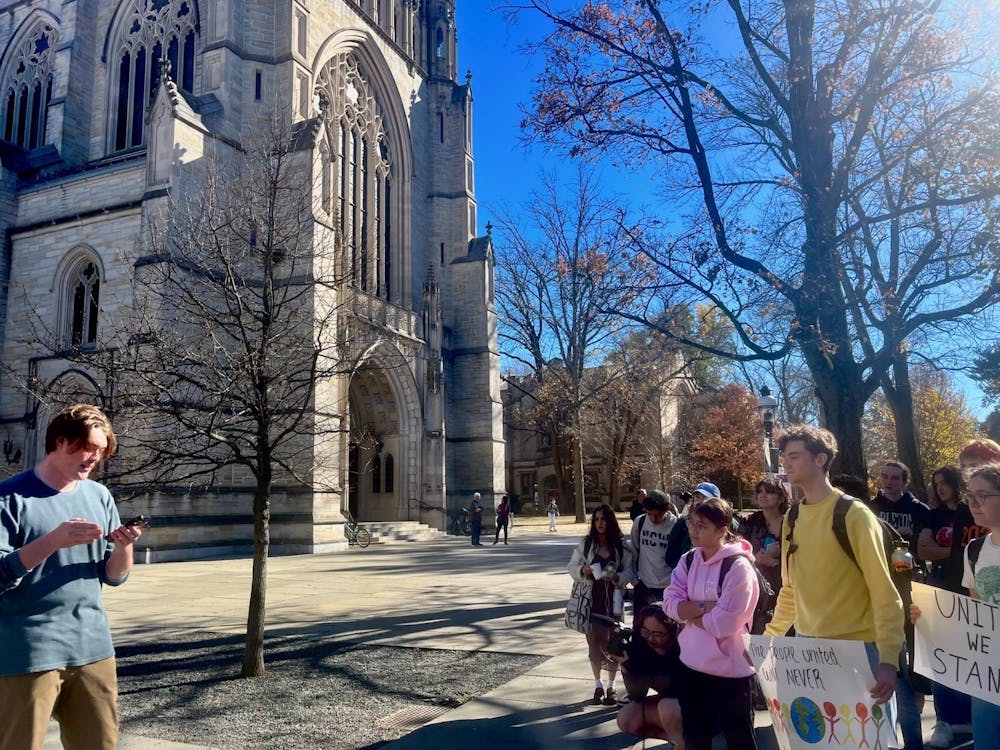Early this February, my colleague Alexander Margulis penned a column calling on Princeton and its students to prepare for the climate catastrophe that will shape all our respective futures.
Margulis scaffolds much of his argument with a 2019 essay by the novelist Jonathan Franzen entitled “What If We Stopped Pretending?” where he argues that “psychology and political reality” prevent “human nature” from changing anytime soon to allow for collective action that could stop climate change. As a result, Franzen says, it doesn’t make sense to talk about saving the planet, and we should focus on mitigating the most imminent effects of climate catastrophe in our communities.
To an extent, I agree with Margulis and Franzen — as individuals, we can think about climate change on a local level. But Margulis takes a wrong turn when he name-checks Sunrise Princeton, the climate action group that I organize with, and indicates that our activism should shift because there’s no “stopping” the climate crisis. In fact, as individuals, we can also make waves in climate action through organizing on a local level.
We cannot give way to the calamitous cynicism that Margulis harbors in his column: There is a better path forward.
It’s important to understand that the logic Margulis’s piece is built upon is fundamentally shaky — for one, Franzen is wrong on the science. Franzen talks about the 2 degrees Celsius above pre-industrial temperature benchmark, a “critical threshold” that, if surpassed, will have disastrous effects on human life. Franzen writes that “in the long run, it probably makes no difference how badly we overshoot two degrees,” and as a result, argues for measures of resilience instead of those of prevention.
It actually does matter how far we overshoot 2 degrees — a rise in temperature 4 degrees above pre-industrial levels would exacerbate the worst effects of climate disaster. Franzen’s belief is that if we focus collective action on “stopping” climate change, we miss an opportunity to adapt ourselves to the disaster-ridden world that we and future generations must live in. Subsequently, he says that an emphasis on mitigating the effects of climate disaster is a nonstarter because of the sheer size of the problem.
Franzen sets up a false opposition: Most, if not all climate action groups — including Sunrise Princeton as well as Sunrise’s national organization — support investing in climate resilience, as well as mitigating the worst of its effects. The two are not mutually exclusive.
Margulis writes that, as a result of left-wing climate organizing groups focusing on preventing the impending crisis, we “entrench” ourselves in a kind of climate denial. While I certainly understand Margulis’s concern, this argument allows people to escape personal accountability. By rejecting the fact that our action, or even policy, can bring about the type of change necessary to improve our situation, we revert to the inaction that is currently perpetuating climate change.

Margulis’s piece itself conveys a different type of denial — the denial that our actions can make change on a large scale. This, again, is false to its core.
Margulis forgets that activists on Princeton’s campus actually won partial dissociation from fossil fuels three years ago, as a part of a “community-initiated” process. Through engagement with the Council on the Princeton University Community’s Resources Committee, activists helped to prove that the issue met the University criteria of “sustained campus interest,” that a “central University value” was “clearly” at stake, and that the University community reached a “consensus on how the University should respond to the situation.”
Even though this decision was rolled back in October 2024 through an opaque process, this instance indicates that student pressure on the University can make change. The kicker? This process needs student engagement to be successful.
This is not to say that people should feel at ease, or that the situation is not existentially dire to our way of life. This is to show that the work of climate organizers has made change at Princeton, and the same can be done worldwide.

Sunrise Princeton is all about combating climate change on the local level. From our campaign to end Princeton’s relationship with BP to pressuring of the University to engage with climate solutions in New Jersey and worldwide, our actions show that the picture Margulis’s article paints of us is narrow and doesn’t encapsulate the thrust of our movement.
Princeton’s administration and its students have agency over how they will address the coming crisis. Will they dig their heads into the sand and convince themselves that the damage is already done, or actively fight for policies that will benefit the University and the climate? We must realize the power we collectively hold to push the University towards a fossil free future because of the impact it will have on the climate more widely.
Franzen, and those like him, make the fundamental assumption that collective action works — but they don’t engage with it because of what they call “political reality.” As a result, they fulfill their own prophecy: By not engaging, they are ensuring collective action won’t be as powerful as it possibly could be.
Assistant Opinion Editor Charlie Yale is a first-year from Omaha, Neb., and can be reached at cyale[at]princeton.edu. This article can be considered Charlie’s “probably justified complaint about Jonathan Franzen,” but, if we’re being honest, that would take more than just 900 words.








